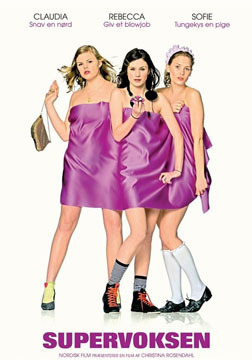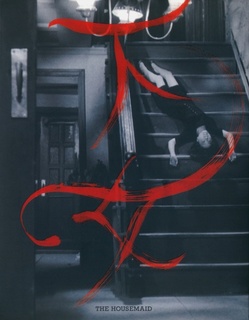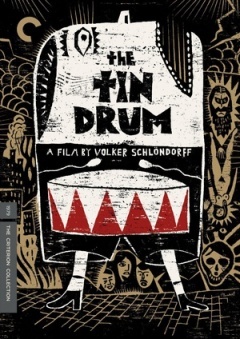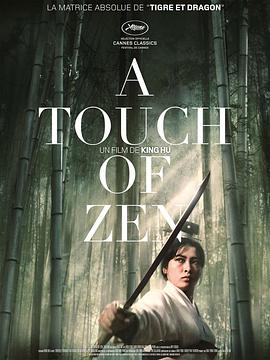- 西瓜云1
- 西瓜云2
- HD
- 蓝光
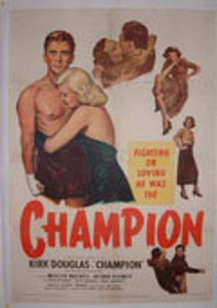
夺得锦标归
- 主演:
- 内详
- 备注:
- HD
- 类型:
- 剧情片 剧情,爱情,运动,黑色电影
- 导演:
- 内详
- 年代:
- 0
- 地区:
- 语言:
- 更新:
- 2023-02-21 09:10
- 简介:
- 简介:柯克·道格拉斯凭借本片首次获得奥斯卡提名。...详细
简介:柯克·道格拉斯凭借本片首次获得奥斯卡提名。
A boxing drama immersed in a noir-inflected cynical vein, Mark Robson’s CHAMPION headlines an in-fine-fettle Kirk Douglas as the titular pugilist Midge Kelly, whose rags-to-riches ascendency is ever so familiar a ne plus ultra of American dream, only it is also beset with all sundry of pitfalls both extrinsic and intrinsic.
Dotting the i’s and cross the t’s of the now warmed-over procedurals of the boxing racket, Robson’s strenuous effort to make the fisticuffs more realistic might make the wonder then, to today’s eyes, it is simply passé, all frenziedly edited shadow-boxing and pulled-punches with invariable thudding sounds added in post-production (a modus operandi, nearly three decades later, still adhered to and tweaked by John G. Avildsen in ROCKY, 1976), which doesn’t lay down enough ballast to the unexpected blow of cerebral hemorrhage, and to make matters worse, championing Midge’s mad-keen monomania to win over an uplifting underdog victory for Johnny Dunne (Daheim) shows up the story’s own myopic obsession of undue dignity of winning.
For one thing, Midge Kelly is not a traditional hero figure, he is a very noir character, aggressive, uncompromising and vile if he needs to be, and Douglas hits all the right spots here, although sometimes he seems too blunt and over-indulgent of his masculinity, some subtlety would be good but that is one thing Douglas doesn’t possess innately, anyhow it is a rather fine performance yielding his first Oscar nomination, which he would refine with more gusto and versatility in Billy Wilder’s masterpiece ACE IN THE HOLE (1951). Also garnering his very Oscar nomination, Arthur Kennedy, who plays Midge’s gammy brother Connie, outstandingly counterbalances Douglas’ impetuous aggression with a cherished understanding and struggling of a normal human being, against what is right or wrong.
Through Midge’s involvement with female characters of varied dispositions - the corn-fed, gracious Emma (a saintly Roman, strikingly telegenic in her breakthrough and invests staggering poise against the short end of the stick), who falls in love with him instead of a more eligible Connie (ableism, isn’t it?), whom he weds under duress then jettisons like a defunct plaything; the uppity dame Grace Diamond (Maxwell, who excels in darting disdainful glances with just enough understatement), whose name is telling enough for what she is after, to whom he exacts petty retaliation after being stiffed when they first meet; then Palmer (Albright), the sculptress wife of his influential manager Harris (Van Rooten), the one he seduces and whose value can be easily measured out with monetary compensation, hardly can one miss the uncomfortable misogynistic and phallocratic whiff by subjecting all these women to his easy preys.
A pellucid if nondescript dissertation of a botched American dream when its toxicity finally catches up with the champ. Coupled with an appositely fatalistic mythos, Mark Robson’s CHAMPION is, for what it is worth, one of the beacons of the sub-genre of pugilistic dramas that more or less retails the same old story with all sorts of variations.
"<>"" && "A boxing drama immersed in a noir-inflected cynical vein, Mark Robson’s CHAMPION headlines an in-fine-fettle Kirk Douglas as the titular pugilist Midge Kelly, whose rags-to-riches ascendency is ever so familiar a ne plus ultra of American dream, only it is also beset with all sundry of pitfalls both extrinsic and intrinsic.
Dotting the i’s and cross the t’s of the now warmed-over procedurals of the boxing racket, Robson’s strenuous effort to make the fisticuffs more realistic might make the wonder then, to today’s eyes, it is simply passé, all frenziedly edited shadow-boxing and pulled-punches with invariable thudding sounds added in post-production (a modus operandi, nearly three decades later, still adhered to and tweaked by John G. Avildsen in ROCKY, 1976), which doesn’t lay down enough ballast to the unexpected blow of cerebral hemorrhage, and to make matters worse, championing Midge’s mad-keen monomania to win over an uplifting underdog victory for Johnny Dunne (Daheim) shows up the story’s own myopic obsession of undue dignity of winning.
For one thing, Midge Kelly is not a traditional hero figure, he is a very noir character, aggressive, uncompromising and vile if he needs to be, and Douglas hits all the right spots here, although sometimes he seems too blunt and over-indulgent of his masculinity, some subtlety would be good but that is one thing Douglas doesn’t possess innately, anyhow it is a rather fine performance yielding his first Oscar nomination, which he would refine with more gusto and versatility in Billy Wilder’s masterpiece ACE IN THE HOLE (1951). Also garnering his very Oscar nomination, Arthur Kennedy, who plays Midge’s gammy brother Connie, outstandingly counterbalances Douglas’ impetuous aggression with a cherished understanding and struggling of a normal human being, against what is right or wrong.
Through Midge’s involvement with female characters of varied dispositions - the corn-fed, gracious Emma (a saintly Roman, strikingly telegenic in her breakthrough and invests staggering poise against the short end of the stick), who falls in love with him instead of a more eligible Connie (ableism, isn’t it?), whom he weds under duress then jettisons like a defunct plaything; the uppity dame Grace Diamond (Maxwell, who excels in darting disdainful glances with just enough understatement), whose name is telling enough for what she is after, to whom he exacts petty retaliation after being stiffed when they first meet; then Palmer (Albright), the sculptress wife of his influential manager Harris (Van Rooten), the one he seduces and whose value can be easily measured out with monetary compensation, hardly can one miss the uncomfortable misogynistic and phallocratic whiff by subjecting all these women to his easy preys.
A pellucid if nondescript dissertation of a botched American dream when its toxicity finally catches up with the champ. Coupled with an appositely fatalistic mythos, Mark Robson’s CHAMPION is, for what it is worth, one of the beacons of the sub-genre of pugilistic dramas that more or less retails the same old story with all sorts of variations.
"<>"暂时没有网友评论该影片"}A boxing drama immersed in a noir-inflected cynical vein, Mark Robson’s CHAMPION headlines an in-fine-fettle Kirk Douglas as the titular pugilist Midge Kelly, whose rags-to-riches ascendency is ever so familiar a ne plus ultra of American dream, only it is also beset with all sundry of pitfalls both extrinsic and intrinsic.
Dotting the i’s and cross the t’s of the now warmed-over procedurals of the boxing racket, Robson’s strenuous effort to make the fisticuffs more realistic might make the wonder then, to today’s eyes, it is simply passé, all frenziedly edited shadow-boxing and pulled-punches with invariable thudding sounds added in post-production (a modus operandi, nearly three decades later, still adhered to and tweaked by John G. Avildsen in ROCKY, 1976), which doesn’t lay down enough ballast to the unexpected blow of cerebral hemorrhage, and to make matters worse, championing Midge’s mad-keen monomania to win over an uplifting underdog victory for Johnny Dunne (Daheim) shows up the story’s own myopic obsession of undue dignity of winning.
For one thing, Midge Kelly is not a traditional hero figure, he is a very noir character, aggressive, uncompromising and vile if he needs to be, and Douglas hits all the right spots here, although sometimes he seems too blunt and over-indulgent of his masculinity, some subtlety would be good but that is one thing Douglas doesn’t possess innately, anyhow it is a rather fine performance yielding his first Oscar nomination, which he would refine with more gusto and versatility in Billy Wilder’s masterpiece ACE IN THE HOLE (1951). Also garnering his very Oscar nomination, Arthur Kennedy, who plays Midge’s gammy brother Connie, outstandingly counterbalances Douglas’ impetuous aggression with a cherished understanding and struggling of a normal human being, against what is right or wrong.
Through Midge’s involvement with female characters of varied dispositions - the corn-fed, gracious Emma (a saintly Roman, strikingly telegenic in her breakthrough and invests staggering poise against the short end of the stick), who falls in love with him instead of a more eligible Connie (ableism, isn’t it?), whom he weds under duress then jettisons like a defunct plaything; the uppity dame Grace Diamond (Maxwell, who excels in darting disdainful glances with just enough understatement), whose name is telling enough for what she is after, to whom he exacts petty retaliation after being stiffed when they first meet; then Palmer (Albright), the sculptress wife of his influential manager Harris (Van Rooten), the one he seduces and whose value can be easily measured out with monetary compensation, hardly can one miss the uncomfortable misogynistic and phallocratic whiff by subjecting all these women to his easy preys.
A pellucid if nondescript dissertation of a botched American dream when its toxicity finally catches up with the champ. Coupled with an appositely fatalistic mythos, Mark Robson’s CHAMPION is, for what it is worth, one of the beacons of the sub-genre of pugilistic dramas that more or less retails the same old story with all sorts of variations.
